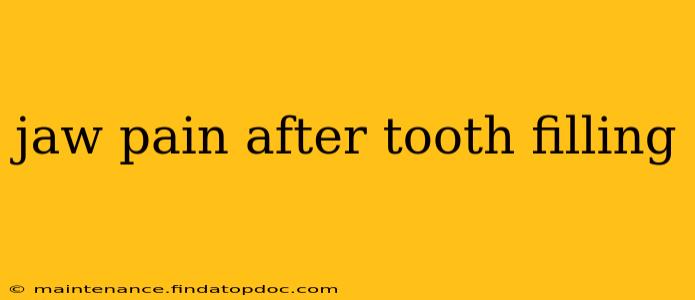Experiencing jaw pain after a tooth filling is a common concern, and it's crucial to understand the potential causes and how to manage this discomfort. While a simple filling usually doesn't directly cause jaw pain, several factors related to the procedure or pre-existing conditions could be the culprits. This comprehensive guide explores the possible reasons behind post-filling jaw pain, effective treatment options, and preventative measures.
What Causes Jaw Pain After a Tooth Filling?
Several factors can contribute to jaw pain following a tooth filling procedure. These can range from simple irritations to more complex underlying issues.
-
TMJ Disorder (Temporomandibular Joint Disorder): This is a common cause of jaw pain, characterized by pain and dysfunction in the temporomandibular joint, which connects your jaw to your skull. The stress and discomfort of a dental procedure can exacerbate existing TMJ symptoms or even trigger a new episode. The procedure itself may not be the direct cause, but the subsequent changes in bite or altered jaw position could be contributing factors.
-
Inflammation: Minor inflammation from the filling procedure itself is possible. The tissues surrounding the filled tooth may be slightly irritated, leading to localized pain that can radiate to the jaw. This usually subsides within a few days.
-
High Filling: If the filling is placed too high, it can alter your bite, leading to increased pressure and pain in the jaw muscles. This misalignment can force your jaw into an unnatural position, causing pain and discomfort.
-
Bruxism (Teeth Grinding): If you grind your teeth, particularly at night (sleep bruxism), a new filling might alter your bite, making you more prone to grinding and subsequently increasing jaw pain.
-
Sinus Infection: In some cases, pain originating from a sinus infection can be misinterpreted as jaw pain. The proximity of the sinuses to the upper teeth can cause referred pain, making it feel like the jaw is the source of the discomfort.
-
Infection: While rare with modern dental practices, an infection at the filling site is a possibility. This usually presents with localized pain, swelling, and possibly fever.
How Long Does Jaw Pain After a Tooth Filling Last?
The duration of jaw pain after a tooth filling varies considerably depending on the underlying cause. Minor inflammation typically resolves within a few days. However, if the pain is related to TMJ disorder, bruxism, or a high filling, it could persist for a longer period—even weeks or months if left untreated. Any persistent or worsening jaw pain warrants a visit to your dentist.
What to Do if You Have Jaw Pain After a Tooth Filling?
If you're experiencing jaw pain after getting a tooth filling, the first step is to contact your dentist. They can properly assess the situation and determine the underlying cause. Here's what you can do in the meantime:
-
Over-the-counter pain relievers: Ibuprofen or acetaminophen can help manage mild to moderate pain.
-
Gentle jaw massage: Gently massaging your jaw muscles can help relieve tension.
-
Warm or cold compresses: Applying warm or cold compresses to the affected area can provide some relief. Experiment to see which works better for you.
-
Avoid chewing on the affected side: This will reduce pressure and strain on the jaw.
-
Soft foods: Stick to a diet of soft foods to minimize jaw movement and discomfort.
Can a Tooth Filling Cause TMJ?
A tooth filling itself does not directly cause TMJ disorder. However, an improperly placed filling that alters your bite can exacerbate existing TMJ symptoms or contribute to the development of TMJ problems in predisposed individuals. This is because a change in bite forces the jaw into a different position, potentially straining the temporomandibular joint.
Is Jaw Pain After a Filling Normal?
Mild, temporary discomfort is relatively normal immediately after a filling. However, persistent, intense, or worsening jaw pain is not. This indicates a need for professional dental attention.
When Should I See a Dentist About Jaw Pain After a Tooth Filling?
Seek immediate dental attention if:
- The pain is severe or intense.
- The pain is accompanied by swelling, fever, or redness.
- The pain persists for more than a few days.
- The pain interferes with your ability to eat or speak.
Addressing jaw pain promptly is crucial for preventing complications and ensuring optimal oral health. Regular dental checkups and open communication with your dentist are vital for maintaining a healthy and comfortable bite. Remember, this information is for general knowledge and should not replace professional medical advice. Always consult your dentist for diagnosis and treatment.
